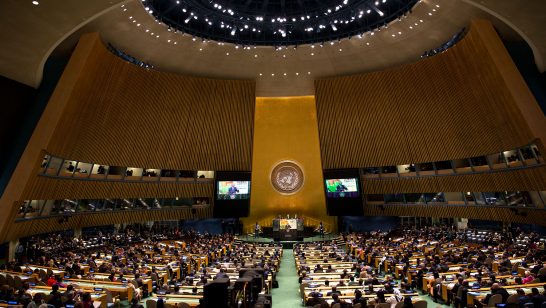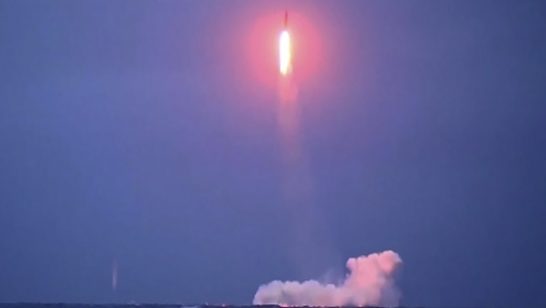
Condemnation has come swiftly from many observers since the United Kingdom released its long-awaited Integrated Review last month. Announced changes to its nuclear weapons posture will make the international nuclear environment “significantly worse”. The raising of a self-imposed cap on its nuclear arsenal from 225 (and a projected 180 by the mid-2020s) to 260 is “not consistent” with disarmament commitments under the Nuclear Non-Proliferation Treaty (NPT), raising difficult questions for that community in advance of the Review Conference scheduled for August 2021. The decision to not provide further information about its operational stockpile, including the number of deployed warheads and missiles, has “major negative implications” for its previously stated commitment to nuclear transparency.
For many, the policy reversal was a shock, as the UK had developed an image as the “most progressive of the world’s nuclear-armed powers”. Yet the UK decision fits neatly — if unfortunately — into a pattern of re-emerging arms racing dynamics. In 2021 alone, the United States deployed B-1B nuclear bombers to Norway for the first time, Russia reportedly tested a new class of nuclear-tipped torpedoes on its submarine cruiser, and China successfully conducted an antiballistic missile test and has reportedly expanded construction of ICBM launch facilities. The five-year extension of the New Strategic Arms Reduction Treaty threatens to be a temporary reprieve in an extended nadir in nuclear diplomacy. The UK is simply the latest nuclear-weapon State to strengthen their arsenal, extend their strategic ambiguity, and strengthen their deterrent capability.
In its Integrated Review, the UK cited the Russian Federation as the “most acute threat” to its national security, and China as “systemic competitor” and biggest “state-based threat” to its economic security. This hostile casting, in line with notions of “Great Power competition” or “major country competition” identified by the United States and China, respectively, and similar confrontational language from the Russian Federation, underlines that current nuclear doctrines and postures are manifestations of the significantly deteriorated strategic environment. The way forward is not misguided hope in moral decisions by ‘responsible’ nuclear weapon States, but addressing that environment head-on to restore a minimal degree of trust and confidence. Actions to this end can help create a more cooperative atmosphere at the NPT Review Conference as well.
An upcoming meeting of the five NPT nuclear-weapon States—China, France, Russian Federation, the United Kingdom, and the United States—presents an early opportunity in one of the few focused venues that can contribute directly to that end. It is welcome news that the group’s work on nuclear doctrines and strategic risk reduction will extend beyond the next NPT Review Conference, but the States should consider dedicated platforms (e.g. permanent working groups) to facilitate sustained exchange on those topics. Expanding working-level participation—for instance engaging military officials in a discussion of large-scale exercises or expert-level contacts to exchange on modernization programmes—could extend existing strategic dialogue naturally, while setting aside touchier topics of restraint or reductions.
The expressed desire among the five States to enhance common understanding should also extend to technological areas of concern. The UK Integrated Review for the first time invoked the prospect of “emerging technologies” (alongside biological and chemical capabilities) that could lead it to reconsider security assurances granted to non-nuclear weapon States party to the NPT. There is a need for the nuclear-weapon States to identify those technologies together. This would constitute a first key step to gauging their impact on strategic stability, and towards the longer-term possibility of negotiating agreements to curb that impact: running the gamut from principles of appropriate conduct to deployment limits and disarmament treaties.
In addition, the five NPT nuclear-weapon States would be well placed to direct their work externally, developing blueprints in areas of joint interest. This includes the way ahead with Iran, and a possible extension of the three-month stopgap agreement that allowed continued international monitoring of nuclear material production sites. Doing so would account for the upcoming presidential election in that country, likely to play a determinant role in the future of its nuclear programme and the final fate of the 2015 nuclear agreement. Meetings in Vienna this week suggest positive developments on that front. Similarly the five could engage on other nuclear weapon possessors, including North Korea, which continues its arsenal development—displaying a new submarine-launched ballistic missile in January and resuming ballistic missile tests in March—with implications that resonate far beyond the Korean Peninsula.
Exploration of the above issues are unlikely to produce easy consensus, let alone signed agreements. Yet the process of engagement will serve as a helpful reminder that there exist strategic challenges the nuclear-weapon States can only tackle effectively together. That the Integrated Review also predicted a likely CBRN terrorist attack by 2030 is an indictment on receding multilateralism in non-proliferation and nuclear security (another victim of worsened great power relations). Reversing the trend there, and elsewhere, is a tall order. But rebuilding trust and confidence in areas of strategic impact represents the most effective means to improve the environment, for the NPT Review Conference and beyond. Only then can existing nuclear doctrines and postures be rendered obsolete, and the 260 number as easily forgotten as 225 or 180.
The opinions articulated above represent the views of the author(s) and do not necessarily reflect the position of the European Leadership Network or any of its members. The ELN’s aim is to encourage debates that will help develop Europe’s capacity to address the pressing foreign, defence, and security policy challenges of our time.
Image: Wikimedia



